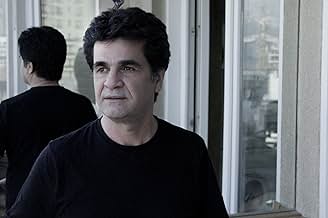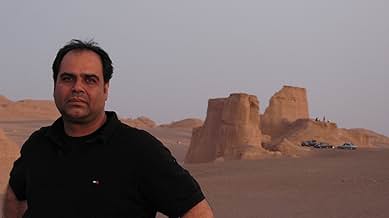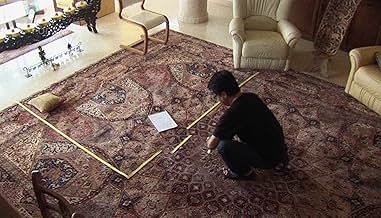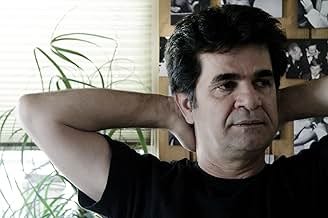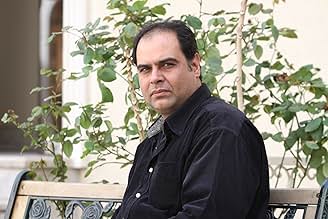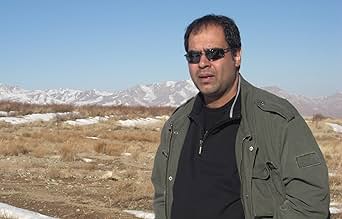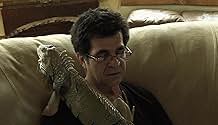CALIFICACIÓN DE IMDb
7.4/10
5.8 k
TU CALIFICACIÓN
Han pasado meses desde que Jafar Panahi, atrapado en la cárcel, ha estado esperando el veredicto de la corte de apelaciones.Han pasado meses desde que Jafar Panahi, atrapado en la cárcel, ha estado esperando el veredicto de la corte de apelaciones.Han pasado meses desde que Jafar Panahi, atrapado en la cárcel, ha estado esperando el veredicto de la corte de apelaciones.
- Premios
- 10 premios ganados y 14 nominaciones en total
- Dirección
- Guionista
- Todo el elenco y el equipo
- Producción, taquilla y más en IMDbPro
Opiniones destacadas
A late addition to the Cannes 2011 programme after being smuggled into France inside a cake, Iranian director Jafar Panahi's "This is Not a Film" (2011) is by no means your average political documentary. The 75-minute piece, shot partially on an iPhone, captures the day-to-day life of Panahi during a state-imposed house arrest in his Tehran apartment as he appeals a six year prison sentence and 20 year filmmaking ban for his opposition to the 2011 Iranian elections.
Here in the Western world, our access to information, democratic governments, and human rights are taken for granted. Panahi and Mirtahmasb are putting their lives on the line to tell the stories they feel they must tell, in the hope that, one day, their nation will be able to have the same sort of pro-democratic freedom as the rest of us. Gripping entertainment. Little by little "This Is Not a Film" leads to a final scene of overwhelming power. Anyone interested in cinema and/or Iran owes it to themselves to become familiar with this "not" film.
Here in the Western world, our access to information, democratic governments, and human rights are taken for granted. Panahi and Mirtahmasb are putting their lives on the line to tell the stories they feel they must tell, in the hope that, one day, their nation will be able to have the same sort of pro-democratic freedom as the rest of us. Gripping entertainment. Little by little "This Is Not a Film" leads to a final scene of overwhelming power. Anyone interested in cinema and/or Iran owes it to themselves to become familiar with this "not" film.
Jafar Panahi: "If we could tell a film, then why make a film?"
My interest in Iranian cinema started with Dayereh (2000) by Jafar Panahi and since then I've watched a few other Iranian films of which most are directed by him. I remember after the first film I saw, I read about him on Wikipedia and read about his sentence and ban from film making. It is quite shocking and this gives more sense to this documentary which would have never been seen if it hadn't been smuggled out of Iran on a USB stick.
In film nist starts with Jafar Panahi having breakfast over the course of breakfast he calls a friend, Iranian documentary director Mojtaba Mirtahmasb asking him to come over. The only link we have with the outside world is through his phone. Before his friend comes Jafar has a phone call with his lawyer who confirms that he will definitely have to go to prison and that she may try to reduce the ban duration on appeal but it's probably all she can do. She tells him that it is not a judiciary sentence but a political one. When his friend arrives, Jafar Panahi explains the last films he wanted to do and how they were both denied approval and had to let them go. He has the script of one and decides that he can explain it, using his living room, the carpet representing the room in which a girl is- also- imprisoned and a chair for the window.
This is not a film is exactly what the title says it is. It is a day, a documentary at most. Most of Jafar Panahi movies give a lot of freedom to (amateur) actors who creates the whole atmosphere. It seems clear that this was not planned either, this has no script or no particular goal except to have a camera there, to document whatever could be documented before it's too late.
The setting is also particular as the whole town goes crazy over the celebrations of "Fireworks Wednesday" and the two friends stay inside, wondering what to do and how to do it. It gets particularly strange when Jafar Panahi starts recording with his mobile phone, filming the act of being filmed. I think the highest point of this film being not a film, is when Jafar Panahi explains the story of this film he was going to make and in the middle of replaying it... He suddenly becomes silent and his face tells us that he has strong doubts and this is where the quote I picked is said, he doubts the whole concept of a film, of telling a story and if it is a story worth telling. It might be reduced to the film he was discussing in particular, however, I would think that it goes beyond that, that it touches every film he's done including this one.
A lot of the issues are not entirely discussed, maybe as a way to retain dignity in the face of a sentence or simply because they are not thought out to be relevant. These very blunt, almost political and philosophical moments contrast with the comical aspect of his iguana pet slowly climbing a bookshelf or the neighbor who tries to leave her dog with him before he simply starts barking. It is also strongly incidental as when a young arts student walk in to come and pick the trash, a job he does to help out his sister and brother-in-law, suddenly the story focuses on him and as he goes on to pick up the trash, we follow him. In a way, isn't that what movies always tried to do, follow the strange happenings of life?
I liked: It doesn't get much more explicitly banned film, well this is not a film.
I disliked: Very random in a bumpy unscripted way.
70/100 If you are looking for a deep political look in the situation of Iran's cinema industry and its struggle then you won't find it. This is a purely individual look at what it is to be a forbidden film maker.
Read more reviews at: www.theordinaryreview.blogspot.com
My interest in Iranian cinema started with Dayereh (2000) by Jafar Panahi and since then I've watched a few other Iranian films of which most are directed by him. I remember after the first film I saw, I read about him on Wikipedia and read about his sentence and ban from film making. It is quite shocking and this gives more sense to this documentary which would have never been seen if it hadn't been smuggled out of Iran on a USB stick.
In film nist starts with Jafar Panahi having breakfast over the course of breakfast he calls a friend, Iranian documentary director Mojtaba Mirtahmasb asking him to come over. The only link we have with the outside world is through his phone. Before his friend comes Jafar has a phone call with his lawyer who confirms that he will definitely have to go to prison and that she may try to reduce the ban duration on appeal but it's probably all she can do. She tells him that it is not a judiciary sentence but a political one. When his friend arrives, Jafar Panahi explains the last films he wanted to do and how they were both denied approval and had to let them go. He has the script of one and decides that he can explain it, using his living room, the carpet representing the room in which a girl is- also- imprisoned and a chair for the window.
This is not a film is exactly what the title says it is. It is a day, a documentary at most. Most of Jafar Panahi movies give a lot of freedom to (amateur) actors who creates the whole atmosphere. It seems clear that this was not planned either, this has no script or no particular goal except to have a camera there, to document whatever could be documented before it's too late.
The setting is also particular as the whole town goes crazy over the celebrations of "Fireworks Wednesday" and the two friends stay inside, wondering what to do and how to do it. It gets particularly strange when Jafar Panahi starts recording with his mobile phone, filming the act of being filmed. I think the highest point of this film being not a film, is when Jafar Panahi explains the story of this film he was going to make and in the middle of replaying it... He suddenly becomes silent and his face tells us that he has strong doubts and this is where the quote I picked is said, he doubts the whole concept of a film, of telling a story and if it is a story worth telling. It might be reduced to the film he was discussing in particular, however, I would think that it goes beyond that, that it touches every film he's done including this one.
A lot of the issues are not entirely discussed, maybe as a way to retain dignity in the face of a sentence or simply because they are not thought out to be relevant. These very blunt, almost political and philosophical moments contrast with the comical aspect of his iguana pet slowly climbing a bookshelf or the neighbor who tries to leave her dog with him before he simply starts barking. It is also strongly incidental as when a young arts student walk in to come and pick the trash, a job he does to help out his sister and brother-in-law, suddenly the story focuses on him and as he goes on to pick up the trash, we follow him. In a way, isn't that what movies always tried to do, follow the strange happenings of life?
I liked: It doesn't get much more explicitly banned film, well this is not a film.
I disliked: Very random in a bumpy unscripted way.
70/100 If you are looking for a deep political look in the situation of Iran's cinema industry and its struggle then you won't find it. This is a purely individual look at what it is to be a forbidden film maker.
Read more reviews at: www.theordinaryreview.blogspot.com
Iranian director Jafar Panahi is one of world's most important movie makers nowadays, while also a victim of the oppressive regime in his country. Arrested, together with other artists, during the events following the Iranian presidential elections in 2009, he spent several months in prison. He was freed then on bail while the judicial procedure against him was going on. Mr. Panahi was eventually sentenced to 6 years of prison and 20 years ban to make movies.
It was during the period spent at home in 2010 that Jafar Panahi made this movie, with the title This is Not a Film (In Film Nist). A friend, documentary producer Mojtaba Mirtahmasb (the author of Lady of the Roses, 2008), came with a consumer-grade camera and shot the footage for a 75 minutes video, having Mr. Panahi as co-director, screenwriter, film editor and star. The video was eventually smuggled outside Iran on a flash drive and screened at the 2011 Cannes Festival.
It's just that: 75 minutes in a day spent by Jafar Panahi at home, waiting for the result of the trial. He talks to the phone with his lawyer, then feeds his pet (who is a very nice iguana), then talks with the cameraman shooting the footage about a project for a new film, rejected by the censorship, memories from some of his movies come and go, suddenly a terrible noise of explosions is heard - it's nothing than fireworks, and Mr. Panahi goes to the window to shoot them with his cell phone.
A movie that is not a movie, says Mr. Panahi. It's just mundane reality. Well, it's not that simple: this movie is a non-movie while this non-movie is a movie. Because it's his reality, his universe, which is sending us to the universe of his movies. All his movies talk actually about him, about his universe, and it becomes obvious here, in this non-movie which carries all the tension between image and reality - reality sublimated in cinematic image. Like Mozart, this moviemaker thinks only in artistic constructions. For Mozart any fact of life was musical sound, musical rhythm, for Panahi every fact of life is cinematic image, cinematic rhythm. Look, even his concerns for the sentence to come become art! However, the strongest association should be made to Beethoven! This moviemaker carries all the tension between reality and art, all his creation is fully aware of the paradoxical relationship between reality and art: reality mirrored in art, art mirrored in reality, art suffering that reality struggles to keep its autonomy, reality suffering that it is taken for art.
It was during the period spent at home in 2010 that Jafar Panahi made this movie, with the title This is Not a Film (In Film Nist). A friend, documentary producer Mojtaba Mirtahmasb (the author of Lady of the Roses, 2008), came with a consumer-grade camera and shot the footage for a 75 minutes video, having Mr. Panahi as co-director, screenwriter, film editor and star. The video was eventually smuggled outside Iran on a flash drive and screened at the 2011 Cannes Festival.
It's just that: 75 minutes in a day spent by Jafar Panahi at home, waiting for the result of the trial. He talks to the phone with his lawyer, then feeds his pet (who is a very nice iguana), then talks with the cameraman shooting the footage about a project for a new film, rejected by the censorship, memories from some of his movies come and go, suddenly a terrible noise of explosions is heard - it's nothing than fireworks, and Mr. Panahi goes to the window to shoot them with his cell phone.
A movie that is not a movie, says Mr. Panahi. It's just mundane reality. Well, it's not that simple: this movie is a non-movie while this non-movie is a movie. Because it's his reality, his universe, which is sending us to the universe of his movies. All his movies talk actually about him, about his universe, and it becomes obvious here, in this non-movie which carries all the tension between image and reality - reality sublimated in cinematic image. Like Mozart, this moviemaker thinks only in artistic constructions. For Mozart any fact of life was musical sound, musical rhythm, for Panahi every fact of life is cinematic image, cinematic rhythm. Look, even his concerns for the sentence to come become art! However, the strongest association should be made to Beethoven! This moviemaker carries all the tension between reality and art, all his creation is fully aware of the paradoxical relationship between reality and art: reality mirrored in art, art mirrored in reality, art suffering that reality struggles to keep its autonomy, reality suffering that it is taken for art.
In only seventy-six minutes, the "documentary" (if we can call it that) This is Not a Film manages to do much in the way of silent rebellion, documentation, personal-freedom, and expressionism in a beautifully unconventional sense. It focuses on director Jafar Panahi, who was criminally silenced by the Iranian government for making films deemed as "propaganda." During this particular time, and in current times, Panahi is prohibited from making films and affiliating himself with any types of films. This fact alone makes This is Not a Film bolder and one of the most ostentatious documentaries ever made; mainly because it's a project that never was supposed to even be a thought in Panahi's head.
We see Panahi, alone in his large high-rise apartment, go about his daily activities, which include eating breakfast, playing with his daughter's iguana named Igi, analyzing his older films in a very deep sense, acting out scenes from his movies, and repeatedly calling his attorney to get a ruling on his case. Because of his "propaganda" films, Panahi has the potential to face six years in prison and the possibility of never directing another film again. This is a scary thought for a man who is clearly not our of words to say.
The naturalism and simplicity is what immediately sold me on this film. It's not hard to tell that much of this picture was comprised on Panahi's spontaneous thoughts. Nothing is very consistent; not all of it is particularly compelling, but all of it is truly a sight to behold. This is Not a Film, in order to receive distribution, was put on a flash drive and smuggled out of Iran in a cake, making this a truly unique picture just in its story. How many films (or "films") can you say you've seen that really shouldn't have been made? While my biggest compliment to the "film" is its naturalism and biographical nature, it also is my most prominent complaint. Many things happen here, some interesting, some not, making this experience fluctuate in quality more-so than any other picture I've seen this year. A strong part of me absolutely lauds Panahi for his bravery and commitment to get his "film" released, yet because of its loose, lax nature, I question why he chose to make it more about his typical day instead of voicing an opinion on the cruelty of the Iranian government. Now, I realize how deviant and asking that sounds, seeing as it was incalculably daring for Panahi to make a film at all. But why not go for broke if you chose to go back on a law at all? Why not question or defend the "propaganda" accusation his films now bear? Why not take in account how you really feel about this whole thing? However, one surprisingly elegant thing he does in This is Not a Film is question what exactly a film is? Moreover, does this picture he's making now count as a film? Is it "illegal" that he's getting his pal Mojtaba Mirtahmasb to film much of it on a cell-phone camera? Is it because it's spontaneous, and follows a very non-linear style that it doesn't qualify as a film? Does a film need to be a certain length to be constituted that? Does anything need to happen? I was reminded of those short films I always find myself watching on Youtube from the late 1800's to the early 1900's of little skits or documentaries that briefly regard life/humor/culture of a country at that specific time. Were they films? They never seemed to follow a strict plot line.
This is Not a Film is something people from all countries (especially America) should watch in order to truly view how repressed, censored, and limited other countries can be. In America, grotesque films like The Human Centipede can be made, showcasing disgust and loathe at its height, 2016: Obama's America can be made, a film that deliberately regards almost everything the current US president says as lies and cites his motives as unworthy, and The Hangover Part II can be made, a raunchy comedic exercise capitalizing off lewdness and politically incorrect humor. The fact that This is Not a Film came to be may sit indifferently with people from America, but the fact that it exists is an astonishing landmark for Iranian freedom of speech. While I can't recommend this work in an overbearing nature, if you go to a video store and find it there, it is probably the one you should pick up for its importance and bold roots. But since it isn't a film, I technically should be reviewing it or saying any of this.
Starring: Jafar Panahi. Directed by: Jafar Panahi and Mojtaba Mirtahmasb.
We see Panahi, alone in his large high-rise apartment, go about his daily activities, which include eating breakfast, playing with his daughter's iguana named Igi, analyzing his older films in a very deep sense, acting out scenes from his movies, and repeatedly calling his attorney to get a ruling on his case. Because of his "propaganda" films, Panahi has the potential to face six years in prison and the possibility of never directing another film again. This is a scary thought for a man who is clearly not our of words to say.
The naturalism and simplicity is what immediately sold me on this film. It's not hard to tell that much of this picture was comprised on Panahi's spontaneous thoughts. Nothing is very consistent; not all of it is particularly compelling, but all of it is truly a sight to behold. This is Not a Film, in order to receive distribution, was put on a flash drive and smuggled out of Iran in a cake, making this a truly unique picture just in its story. How many films (or "films") can you say you've seen that really shouldn't have been made? While my biggest compliment to the "film" is its naturalism and biographical nature, it also is my most prominent complaint. Many things happen here, some interesting, some not, making this experience fluctuate in quality more-so than any other picture I've seen this year. A strong part of me absolutely lauds Panahi for his bravery and commitment to get his "film" released, yet because of its loose, lax nature, I question why he chose to make it more about his typical day instead of voicing an opinion on the cruelty of the Iranian government. Now, I realize how deviant and asking that sounds, seeing as it was incalculably daring for Panahi to make a film at all. But why not go for broke if you chose to go back on a law at all? Why not question or defend the "propaganda" accusation his films now bear? Why not take in account how you really feel about this whole thing? However, one surprisingly elegant thing he does in This is Not a Film is question what exactly a film is? Moreover, does this picture he's making now count as a film? Is it "illegal" that he's getting his pal Mojtaba Mirtahmasb to film much of it on a cell-phone camera? Is it because it's spontaneous, and follows a very non-linear style that it doesn't qualify as a film? Does a film need to be a certain length to be constituted that? Does anything need to happen? I was reminded of those short films I always find myself watching on Youtube from the late 1800's to the early 1900's of little skits or documentaries that briefly regard life/humor/culture of a country at that specific time. Were they films? They never seemed to follow a strict plot line.
This is Not a Film is something people from all countries (especially America) should watch in order to truly view how repressed, censored, and limited other countries can be. In America, grotesque films like The Human Centipede can be made, showcasing disgust and loathe at its height, 2016: Obama's America can be made, a film that deliberately regards almost everything the current US president says as lies and cites his motives as unworthy, and The Hangover Part II can be made, a raunchy comedic exercise capitalizing off lewdness and politically incorrect humor. The fact that This is Not a Film came to be may sit indifferently with people from America, but the fact that it exists is an astonishing landmark for Iranian freedom of speech. While I can't recommend this work in an overbearing nature, if you go to a video store and find it there, it is probably the one you should pick up for its importance and bold roots. But since it isn't a film, I technically should be reviewing it or saying any of this.
Starring: Jafar Panahi. Directed by: Jafar Panahi and Mojtaba Mirtahmasb.
This is not a film and also not a documentary in a proper sense. This is a Video recording of two persons. But the good part is that within the few minutes you will understand why this film had to be made. A person cannot stop his talent for longer. This is happening with Jafar Panahi, the Iranian director who is fighting with his government. He has to stay inside his house without making films and he might go to jail. In the middle you might feel a little bored because of no change in location but eventually you will understand his limitations and the desperation which caused him to make this.
PROS: The film is slow but to some extend you will want to forgive for everything. He tries to make the documentary interesting by telling some of his previous films experiences and those are really amazing. His pet will keep you alive all the time. In few words, I would say that this is one of the best documentaries.
CONS: Got a little bored in the middle.
Message: "Don't stop because of obstructions." Verdict: "A must watch documentary."
PROS: The film is slow but to some extend you will want to forgive for everything. He tries to make the documentary interesting by telling some of his previous films experiences and those are really amazing. His pet will keep you alive all the time. In few words, I would say that this is one of the best documentaries.
CONS: Got a little bored in the middle.
Message: "Don't stop because of obstructions." Verdict: "A must watch documentary."
¿Sabías que…?
- TriviaDirector Jafar Panahi was put under house arrest in 2010 and banned from filmmaking for 20 years. This film was smuggled out of Iran on a USB stick hidden in a cake.
- Citas
Mojtaba Mirtahmasb: It's important that the cameras are ON.
Selecciones populares
Inicia sesión para calificar y agrega a la lista de videos para obtener recomendaciones personalizadas
- How long is This Is Not a Film?Con tecnología de Alexa
Detalles
Taquilla
- Total en EE. UU. y Canadá
- USD 77,016
- Fin de semana de estreno en EE. UU. y Canadá
- USD 12,608
- 4 mar 2012
- Total a nivel mundial
- USD 88,758
- Tiempo de ejecución1 hora 15 minutos
- Color
Contribuir a esta página
Sugiere una edición o agrega el contenido que falta

Principales brechas de datos
By what name was No es una película (2011) officially released in India in English?
Responda

